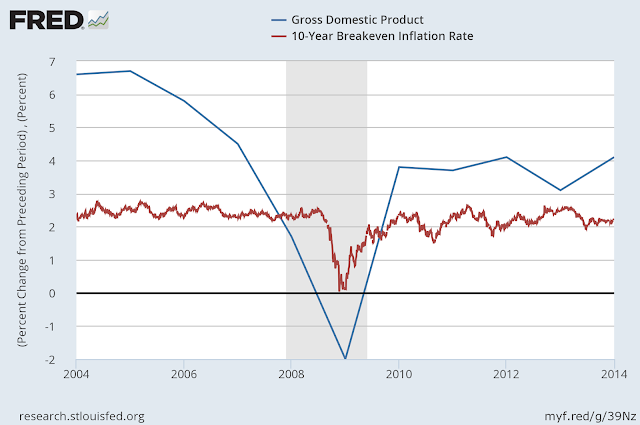The Federal Reserve ignored its own data when it came to the percentage drop off in growth in the Great Recession. The Fed targeted inflation, which seemed to be humming along, and yet, GDP, the Nominal GDP, was dropping way before inflation dropped. This chart tells it all:

The Fed was looking at inflation, the red line, when it should have been looking at the percentage change of (N)GDP, the blue line.
NGDP was dropping by percentage in early 2007, actually starting in 2005, while inflation did not drop until nearly 2009. Of course we have to look at sticky wages for the private sector and we see the greatest percentage drop is attributed to the Great Recession, as many well paying jobs were lost in fall of 2008, leading to the greatest percentage of hourly earnings drop in 2009.

The “sticky wage” concept is that wages, in normal times, tend to creep up. They may even put businesses into a noncompetitive global position. Business had been offshoring jobs, in the process of hollowing out manufacturing in America, even before the Great Recession. The New York Times showed that in early 2008, prior to the mass layoffs at the end of the year, there were real problems growing in the treatment of workers.
According to the Times, productivity grew 60 percent between 1979 and 2007, yet wages stagnated. While I ignore the average wage figures in the article, they could have been higher according to this chart, the productivity clearly has not been rewarded for workers.
The Great Recession unstuck sticky wages. Layoffs were massive in late 2008 as companies are not keen to drop wages, as was done to my father in the Great Depression of the last century. His wages were dropped substantially, but workers were still needed in a developing nation, especially in the oil patch. He kept his job. My father knew an oil worker who worked for an oil company called Superior Oil. He was paid in stock rather than in wages, because the company could not pay wages. He saved the stock and became a millionaire after the Great Depression, while still wearing overalls.













Leave A Comment